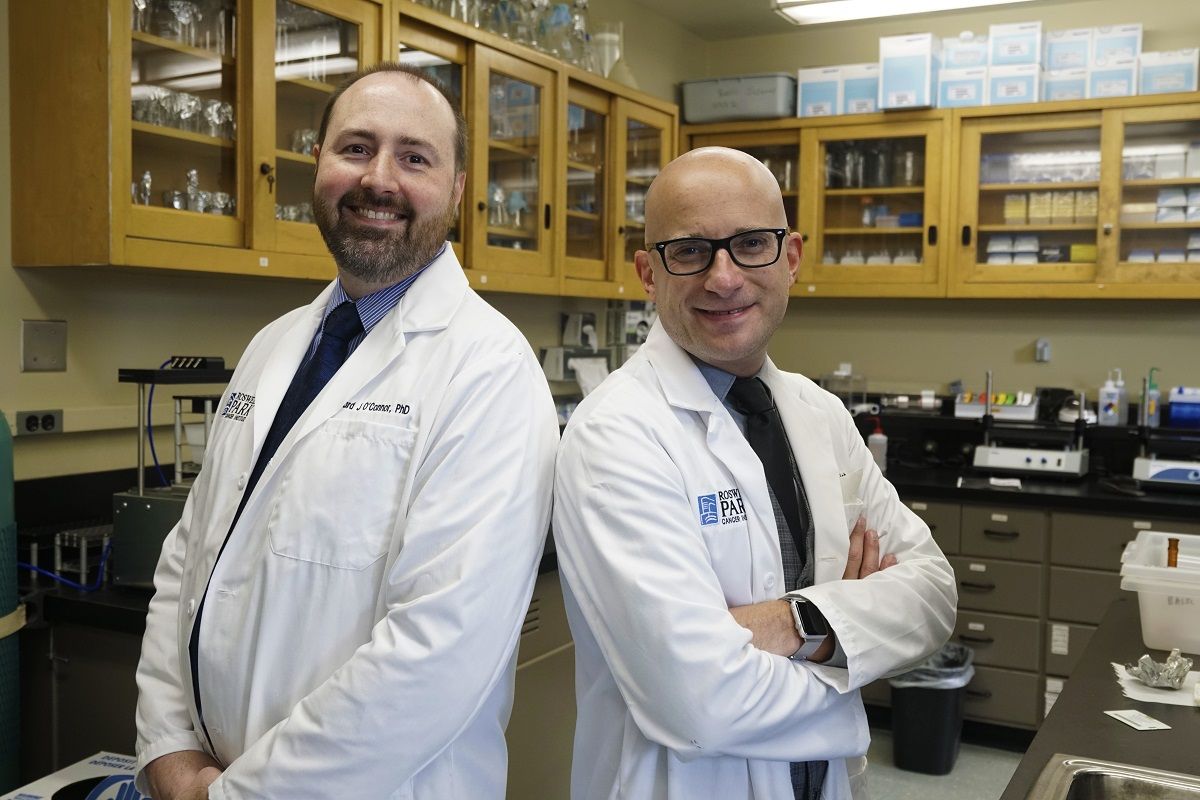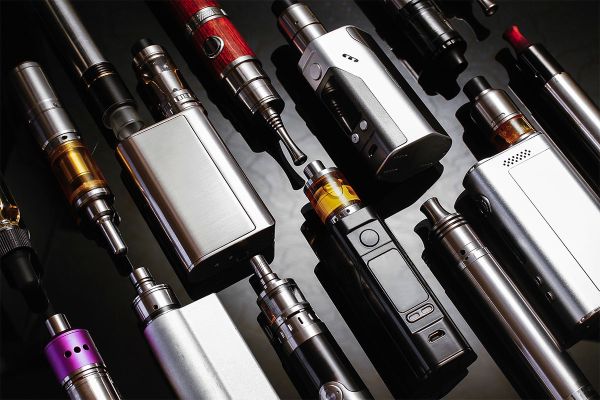Creating a world free from diseases caused by tobacco
The Department of Health Behavior at Roswell Park studies the scientific evidence and provides technical support to reduce tobacco-attributable morbidity and mortality.
Our faculty provide fundamental data for the evaluation of tobacco products and tobacco marketing. We’re often called on for leadership roles in national policy initiatives, and our research is an extensive resource for peer-reviewed data and education at every level.
We also investigate other health behaviors that have a significant impact on cancer, including alcohol use, physical activity, and energy imbalance.
“Our goal is reducing the cancer burden as much possible and as quickly as possible. Tobacco use is responsible for about 30% of all cancer deaths – and it’s the primary focus of our department.”
Research focus
Research is the core component of the Health Behavior department. We study the components of tobacco products, how they are marketed, what consumers understand about them, and what the impact is of policies and industry actions designed to influence tobacco use.
We’re home to two large ‘team-science’ projects:
Population Assessment of Tobacco and Health (PATH) Study
The largest longitudinal study of tobacco use ever conducted.
Learn moreCROFT Center
Studying all aspects of tobacco product flavors to support tobacco regulatory science efforts.
Learn moreServices
On the service front:
- Roswell Park Cessation Services helps about 40,000 smokers each year with their tobacco cessation efforts.
- We run the New York State Smokers Quitline and have programs to help cancer patients and others quit smoking.
- Department faculty are part of the team that developed National Comprehensive Cancer Network guidelines for how cancer patients who smoke should be helped.
- We help Roswell Park patients to quit tobacco by operating one of the most robust tobacco treatment programs for cancer patients in the nation.
Spotlight: Center for Translational Research on Cannabis and Cancer (CTRCC)
The CTRCC launched in 2021 with the goal to understand if, to what extent, and how cannabis and cannabinoid use impacts the health and well-being of individuals and the communities they live in.
Outreach
Roswell Park holds several contracts for community and physician outreach and education throughout western New York. These groups are the ‘consumers’ of the research conducted at Roswell Park and elsewhere; they use it to update local stakeholders on best practices for our shared goal – reducing the cancer burden in our community.
In addition, Health Behavior faculty are often called upon to play a leadership role in national policy initiatives. Their research adds to the existing knowledge base and are reliable resources for smokers, businesses, teachers, administrators and national public policy experts regarding research, information and assistance with tobacco control issues.
Training the next generation of scientists
In addition to our research and community outreach, the Department of Health Behavior is actively involved in hands-on teaching with Master’s and PhD students in our highly competitive graduate studies program.
Our multidisciplinary education model allows students a unique immersive experience, preparing them for successful careers as independent investigators.
Funded by a prestigious five-year, $19.05 million National Cancer Institute grant, the WNY Center for Research on Flavored Tobacco Products (CRoFT) examines both combustible and electronic tobacco products.
Health Behavior projects
Tobacco use is the single most preventable cause of disease and death in the United States. The Department of Health Behavior offers a wide range of tobacco control programs to support individuals and communities to reduce the toll of tobacco use.
Comprehensive, evidence-based cessation interventions for Roswell Park patients, employees, state quitlines, health plans and employer-sponsored programs.
Researching Transcranial Magnetic Stimulation interventions for smoking cessation, reducing alcohol consumption, and increasing physical activity as well as remotely administered interventions to reduce delay discounting and improve tobacco treatment outcomes.
Principal Investigator: Christine Sheffer, PhD
Engaging community stakeholders and youth to change policies and norms about tobacco and tobacco use.
Collaborating with targeted health care providers to provide assistance with the adoption of policies and programs to help smokers achieve cessation.
Director: Martin Mahoney, MD
Evaluating consumer response to product warnings, tobacco marketing, cessation information, point-of-sale displays, and other types of health behavior communications.
Director: Maansi Bansal-Travers, PhD, MS
Assessing design features of leading cigarette brands throughout the world, human smoking behavior, and perceptions of products.
Director: Richard O’Connor, PhD
Collecting and tracking tobacco products purchased in different countries to create cohort data on leading brands.
Director: Richard O’Connor, PhD
Comprehensive database developed to track changes in tobacco packaging.
Director: Maansi Bansal-Travers, PhD, MS
Current clinical trials
High-impact science
- Bhat T, Suresh K, Bogner P, Blount BC, Goniewicz M, Thanavala Y. An Animal Model of Inhaled Vitamin E Acetate and EVALI-like Lung Injury. N Engl J Med 2020; 382(12): 1175-1177. PMC7299285 PMCID: PMC7299285
- Kasza K, Edwards KC, Tang Z, Stanton CA, Sharma E, Halenar MJ, Taylor KA, Donaldson EA, Hull LC, Bansal Travers M, Limpert J, Zandberg I, Gardner LD, Hammad HT, Borek N, Kimmel HL, Compton WM, Hyland A. Correlates of tobacco product cessation among youth and adults in the USA: findings from the PATH Study Waves 1-3 (2013-2016). Tob Control 2020; 29(Suppl. 3): s203-s215. PMC7517709 PMCID: PMC7517709
- Hammond D, Reid JL, Rynard VL, Fong GT, Cummings KM, McNeill A, Hitchman S, Thrasher JF, Goniewicz M, Bansal Travers M, O'Connor R, Levy D, Borland R, White CM. Prevalence of vaping and smoking among adolescents in Canada, England, and the United States: repeat national cross sectional surveys. BMJ 2019; 365: l2219. PMC6582265 PMCID: PMC6582265
- Thanavala Y, Goniewicz M. Vaping-induced severe respiratory disease outbreak: what went wrong? . Lancet Respir Med 2019; 7(12): 1014-1015. PMC7493979 PMCID:PMC7493979
- Pierce JP, Sargent JD, Portnoy DB, White M, Noble M, Kealey S, Borek N, Carusi C, Choi K, Green VR, Kaufman AR, Leas E, Lewis MJ, Margolis KA, Messer K, Shi Y, Silveira ML, Snyder K, Stanton CA, Tanski SE, Bansal Travers M, Trinidad D, Hyland A. Association Between Receptivity to Tobacco Advertising and Progression to Tobacco Use in Youth and Young Adults in the PATH Study. JAMA Pediatr 2018; 172(5): 444-451. PMC5875336 PMCID: PMC5875336
- O'Connor R, Fix B, McNeill A, Goniewicz M, Bansal Travers M, Heckman BW, Cummings KM, Hitchman S, Borland R, Hammond D, Levy D, Gravely S, Fong GT. Characteristics of nicotine vaping products used by participants in the 2016 ITC Four Country Smoking and Vaping Survey. Addiction 2019; 114(Suppl. 1): 15-23. PMC6669098 PMCID: PMC6669098
- Stanton CA, Bansal Travers M, Johnson AL, Sharma E, Katz L, Ambrose BK, Silveira ML, Day H, Sargent J, Borek N, Compton WM, Johnson SE, Kimmel HL, Kaufman AR, Limpert J, Abrams D, Cummings KM, Goniewicz M, Tanski S, Travers M, Hyland A, Pearson JL. Longitudinal e-Cigarette and Cigarette Use Among US Youth in the PATH Study (2013-2015). J Natl Cancer Inst 2019; 111(10): 1088-1096. PMC6792095
In the news
Contact us
Jessica Wagonblott
Scientific Department Administrator
Phone: 716-845-8170
Email: Jessica.Wagonblott@RoswellPark.org











